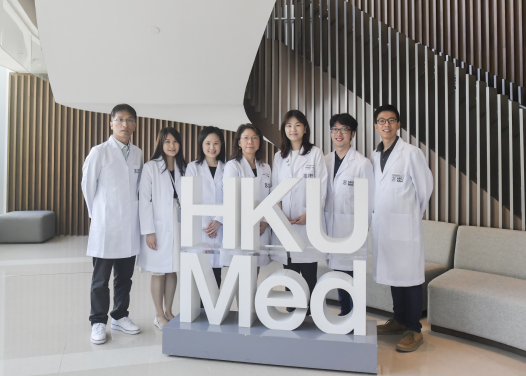Media
HKUMed discovers a novel molecular mechanism driving chemoresistance and tumour recurrence in gastric cancer, unveiling an actionable target for the disease
17 Jul 2023

A research team from HKUMed discovers a novel molecular mechanism driving chemoresistance and tumour recurrence in gastric cancer, unveiling an actionable target for the disease. The research team members pictured include: (from left) Dr Siu Hoi-cheong, Dr Dessy Chan, Dr Helen Yan Hoi-ning, Professor Leung Suet-yi, Professor Stephanie Ma Kwai-yee, Loh Jia-jian and Dr Wong Tin-lok.
A research team led by Professor Stephanie Ma Kwai-yee from School of Biomedical Sciences, LKS Faculty of Medicine, the University of Hong Kong (HKUMed) has uncovered a novel signaling pathway by which RNA editing governs lipid metabolism to promote resistance to chemotherapy and cancer stemness1 in gastric cancer. The findings has been published in Nature Communications [link to publication].
Background
Gastric cancer (GC) remains one of the leading causes of cancer-related deaths globally and in Hong Kong.2 To combat GC, 5-fluorouracil (5-FU) and platinum-based combination chemotherapy is often administered in addition to surgical resection, in the hope of increasing the effectiveness of surgery or minimise the chance of cancer recurrence. However, the emergence of acquired chemoresistance eventually curtails long-term clinical benefits. The myriad of mechanisms driving chemoresistance, compounded with GC constituting various subtypes3 obscure the identification of targets to override chemoresistance. Therefore, understanding subtype-specific vulnerability to override resistance to chemotherapy is fundamental to designing improved treatment options for this deadly disease.
Research method and findings
The research team discovered an unreported mechanism driving chemoresistance by which dysregulated editing at the RNA level instigates aberration in lipid metabolism to endow chemoresistance and cancer stemness.
By integrating clinical intestinal gastric cancer patient-derived organoids lines trained to mimic 5-FU+ cisplatin resistance, multi-omic profiling and validation in pre-clinical GC mouse models, the research team found that the chemotherapy-resistant organoids displayed greater interferon and JAK/STAT signaling4 which upregulated ADAR1 expression. ADAR1, an enzyme that dictates the editing of RNA, fosters a dysregulated lipid network via the editing of multiple enzymes involved in lipid metabolism, including a key enzyme, SCD1. The editing of SCD1 RNA enhanced the stability of mRNA and thereby increased SCD1 protein expression. Consequently, SCD1 facilitated lipid droplet5 formations and β-catenin abundance to confer resistance to chemotherapy as well as a more cancer stemness state. To apply the findings for clinical use, the team further demonstrates that supplementation of an SCD1 inhibitor (SSI4) to a chemotherapy regimen could reverse chemoresistance in gastric cancer and reduce the tumour-initiating subset.
Research significance
‘Our findings identified dysregulated editing at the RNA level of lipid metabolic genes as a novel molecular mechanism underlying resistance to chemotherapy in gastric cancer. By targeting edited SCD1, we can reverse chemoresistance and cancer stemness. This research has laid the foundation for the future development of new treatments for this deadly disease,’ said Professor Stephanie Ma Kwai-yee of the School of Biomedical Sciences, HKUMed, who initiated the study. ‘Further, ADAR1 expression and SCD1 may also be good biomarkers for predicting response to chemotherapy in gastric cancer patients. This spares the patients from going through unnecessary chemotherapy and allows them to carry on more effective treatment.’
About the research team
The collaborative study was led by Professor Stephanie Ma Kwai-yee, School of Biomedical Sciences, HKUMed. Dr Wong Tin-lok and Loh Jia-jian were the co-first authors, with assistance from Max Kam Jun-fung, Dr Tong Man and Dr Zhou Lei. Key collaborators include Professor Leung Suet-yi, Dr Helen Yan Hoi-ning, Dr Siu Hoi-cheong and Dr Dessy Chan, Department of Pathology, School of Clinical Medicine, HKUMed; Professor Yun Jingping and Dr Lu Shixun (co-first author), Department of Pathology, Sun Yat-sen University Cancer Center; Dr Chen Leilei and Dr Ren Xi, Cancer Science Institute of Singapore, National University of Singapore; and Professor John A Copland, Department of Cancer Biology, Mayo Clinic Florida.
Acknowledgements
This work is supported by the Research Grants Council of Hong Kong (RGC) - Theme-based Research Scheme (T12-710/16-R) to Professor Leung Suet-yi and RGC - Research Fellow Scheme (RFS2122-7S05) to Professor Stephanie Ma Kwai-yee, as well as Guangdong Science and Technology Department (2020B1212030004). The team is also thankful for Mayo Clinic Liver SPORE, NCI/NIH P50 (CA210964), NCI STTR R42 (CA195946) and Florida Department of Health (8BC01) for financially supporting the synthesis of SSI4.
Media enquiries
Please contact LKS Faculty of Medicine of the University of Hong Kong by email (medmedia@hku.hk).
1Stemness refers to the ability to self-renewal, proliferate and differentiate. Cancer cells with higher stemness have increased self-renewal and proliferation, resulting in a higher chance of cancer recurrence.
2Gastric cancer is the 6th most common cause of cancer-related deaths in Hong Kong (Hong Kong Cancer Registry 2020) and the 4th leading cause of cancer death worldwide (Morgan E et al. Lancet 2022) in 2020.
3Gastric cancer subtypes include Epstein-Barr virus (EBV) subtype, microsatellite instability etc. Different gastric cancer subtypes have shown divergent response to chemotherapy.
4The JAK/STAT signaling pathway is a chain of interactions between proteins in a cell. The pathway communicates information from chemical signals outside of a cell to the cell nucleus, resulting in the activation of genes through the process of transcription. There are three key parts of JAK/STAT signaling: Janus kinases (JAKs), signal transducer and activator of transcription proteins (STATs), and receptors (which bind the chemical signals). Disrupted JAK-STAT signaling may lead to a variety of diseases, including cancer.
5Lipid droplet is a cellular compartment that is mainly composed of lipids. It is important for storage and metabolism of lipid.
